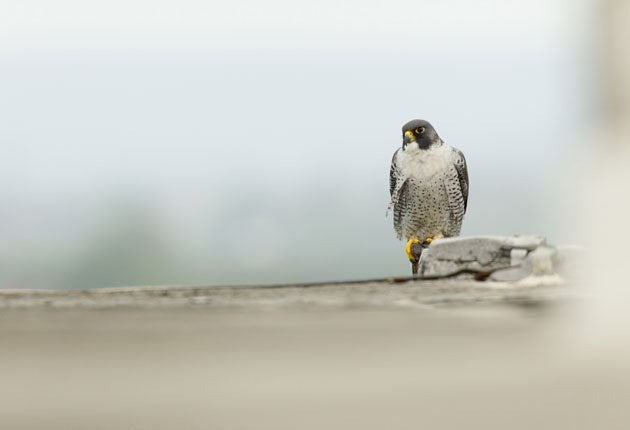Invasion of the falcons: The peregrine is back in town
After decades of declining numbers, the world's fastest creature is populating Britain's cities once again. One pair has even set up home at Tate Modern

For years, only the most intrepid birdwatcher could catch a glimpse of the world's fastest animal, the peregrine falcon, around wild crags, quarries or perched on cliffs thousands of feet above the sea.
But now the regal bird of prey is returning to Britain's cities in droves, with more pairs spotted in the capital this year than for centuries before.
The blue-grey falcon, with its yellow feet, black talons and white-goateed face, can travel at speeds in excess of 200mph when diving for its prey – mainly pigeons – placing it at the top of the avian food chain. Driven out of urban centres over the past 100 years, it is now back and nesting at spots such as London's Tate Modern, Manchester's Arndale centre and at Durham and Chichester Cathedrals.
The number of peregrines in the UK has increased more than fourfold since the 1960s when the population was devastated by the effects of organochlorine pesticide, which thinned the walls of their eggs and brought numbers down to about 360 pairs. There are now thought to be 1,500 pairs across the country, 24 of which live in London – the highest number recorded in the city for hundreds of years.
Paul Stancliffe, a bird specialist at the British Trust for Ornithology, said: "Since the banning of certain pesticides, the peregrines have bounced back. More and more are spreading out looking for new territories.
"They favour places with abundant food that are inaccessible to other predators. As those prime territories get taken up, young birds look for new spaces – buildings in cities and towns provide perfect cliff-like locations."
In what is being hailed as one of nature's "success stories", two of the peregrines that have recolonised London – the city's population has gone from zero to almost capacity in a decade – can now be seen perching on the chimney of Tate Modern.
Visitors to the river front have been taken by surprise by the sight of Misty and Houdini, two 11-year-old falcons, and their two offspring flying over the Thames, only to see them come to rest on a ledge of one of the world's most famous art galleries. However, since peregrines are fiercely territorial and mate for life, the pair are fast becoming the Tate's most loyal visitors.
Lyndon Parker, senior events officer at the Royal Society for the Protection of Birds (RSPB), has been monitoring the pair for the past six years. He said: "It is incredible that people in the city get a chance to see these completely wild birds. People think we have introduced them, or that they aren't real. But we haven't, and they are. They are not ringed and we have no idea where they came from, but we are trying to show people there is amazing wildlife even in urban areas."
While peregrines are returning to Britain's cities, experts said the illegal persecution of the birds by gamekeepers in rural areas is still a cause for "major concern". People living in central Manchester now have a better chance of seeing the falcon than those in certain areas of the Peak District, where the birds frequently fall victim to grouse shooting. Between 1990 and 2009, there were 141 convictions relating to bird of prey persecution, with 98 individuals having game-bird interests.
There is also the issue of nest raids and the demand in the falconry world for birds of wild origin. Last year, a man was arrested as he prepared to board a plane at Birmingham airport bound for Dubai: he had 14 peregrine falcon eggs concealed in his socks and bandaged to his body. According to the RSPB, there were 26 confirmed or probable peregrine nest robberies in 2009, the last year for which figures are available.
The Government added the bird to its UK wildlife crime priority list in February this year. Jeff Knott, species policy officer at the RSPB, said: "We welcome that move, but we would like to see the Government release an actual plan of action to reduce persecution. We don't want anyone denied the opportunity to see the fastest bird in the world."
Join our commenting forum
Join thought-provoking conversations, follow other Independent readers and see their replies
Comments